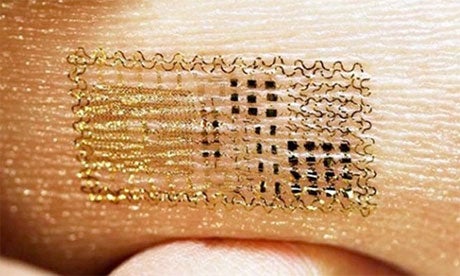Motorola's electronic throat tattoo could act as a mobile phone or a lie detector
The patent filing for an "electronic skin tattoo" could connect to a smartphone or be used to identify individuals "engaging in speaking falsehoods"

Feel like you couldn’t cope with being more than a few feet away from your smartphone? Well Motorola might have the solution, filing a patent for a throat tattoo that incorporates a microphone and power supply.
The patent for “coupling an electronic skin tattoo to a mobile communication device” includes an embedded microphone, a ‘transceiver for enabling wireless communication’ and a power supply that could run from a battery or solar power.
The technology seems to be a combination of the trend for second screen devices such as the Galaxy Gear smartwatch that act as a mediator for our smartphones, and the developing field of electronic tattoos.
In 2011, John Rogers of the University of Illinois unveiled a sensor (see picture above) thinner than a human hair that could be applied to the skin for long-time use, monitoring the wearer’s heart and brain and relaying the information to medical professionals.
Motorola’s patent application though also suggests uses beyond simple communication, mentioning the inclusion of a “galvanic skin response detector” that might turn the device into a lie-detector.
“It is contemplated that a user that may be nervous or engaging in speaking falsehoods may exhibit different galvanic skin response than a more confident, truth telling individual,” reads the patent.
The idea of an un-removable tattoo being applied as a permanent lie-detector sounds like a sci-fi subplot, but apparently it’s not beyond the remit of a patent application.
Join our commenting forum
Join thought-provoking conversations, follow other Independent readers and see their replies
Comments